Firmament review
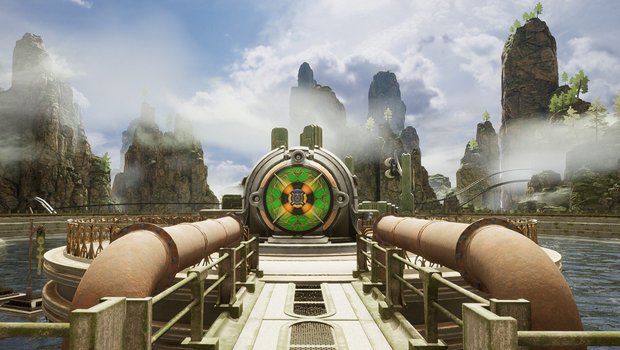
- 1 Comment
Cyan’s latest comes close to heavenly for fans of puzzles and gorgeous worlds to explore
Isolation is a hallmark of Cyan, the studio behind the Myst series. Aside from their one-off foray into MMOs with Myst Online / Uru Live, Cyan's games are known for being solo adventures, devoid not only of other players, but anything resembling companions or even many supporting characters. Their labyrinthine (and sometimes surreal) worlds provide a logic-driven sanctuary of calm for players to escape the busy chaos of modern life. For the most part this is true of Firmament too, as almost everything the company is known for is on full display: beautifully designed areas full of elegant yet imposing atmosphere, fantastic ambient sound design that brings the locations to life, jaw-dropping graphics that push the technical envelope, and devious challenges that may make you want to break something (as I nearly did). And yet in the process, the game takes a small but noticeable step toward breaking the solitary mold by being Cyan’s first single-player game where you are not "alone." Sort of.
Firmament opens with you meeting a ghost, right after awakening from a mechanical "deep-sleep" chamber. You know nothing about who you are aside from being told that you're a "Keeper," and that it's your duty to ensure protection of this mysterious land by initiating a complex process called “The Embrace.” The ghost, quite compellingly voiced by an anonymous member of the Cyan team, accompanies you on your trek through a long-dormant society marked by towering architecture and splendid natural vistas. Traditionalists needn't worry too much, though—this character goes largely unseen and only speaks when you enter a new area, leaving the classic feeling of solitary puzzle-solving intact the rest of the time.
As a result of this addition, one classic element Firmament has done away with is an emphasis on reading. Journals were a core aspect of the Myst games, which allowed you to leisurely pore through pages upon pages of compelling diary entries to learn the backstory of how its (largely offscreen) characters ticked. Firmament has a few scattered notes that shed a little light on the world's lore, but almost anything that has to do with character development comes through narration from the ghost. This material is slowly drip fed upon arriving at key locations, and usually in very quick, bite-sized chunks. It's rather different from Myst in that regard, but it works just fine. Firmament is not trying to be Myst 6, or even Obduction 2. It very much possesses its own identity, and it works.
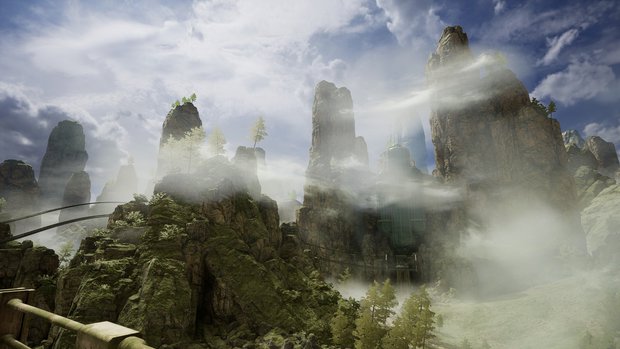
There's one little twist in the gameplay that sets Firmament apart from its forebears as well. Nearly all of the environmental interaction is handled through a wrist-mounted automaton called an Adjunct. Anything you can operate in the world will have a "socket" on it that can be clicked to send your Adjunct hurtling toward it from afar, complete with a rope-like tether of energy running back to you as if you'd fired off a space-age grappling hook. Once your Adjunct has latched onto its target, an interface allows you to perform a variety of interactions—sometimes as basic as opening or closing a door, but frequently much more complicated. Through your Adjunct, you can rotate and raise platforms, drive vehicles, operate cranes, and do just about anything you'd have expected to do in the Myst series (or more). It’s a fun mechanic that brings clarity to your options in any given scenario. A few of the sockets are well-hidden, but by and large this eliminates much in the way of pixel hunting—save for one egregious example we’ll get to shortly.
Cyan flexes the full might of its graphical muscles to show off everything they’ve learned in the years since Obduction ... and oh my word. Firmament has some of the most visually spectacular views and world design I've ever encountered in my decades of playing adventure games. It's got skyscrapers, mountain ridges, "Omniwheels" to cart you to and fro (in Cyan's souped-up take on monorails that I dearly wish existed in real life), more reservoirs than probably any other videogame, and all sorts of other high-up vantage points to showcase its immense landscapes. You could take out the gameplay entirely and it'd still be a fairly worthwhile experience just to see all the sights. The amount of unmistakable love and care that's gone into sculpting these places is inspiring—and each time I thought I'd seen every type of locale the game had to offer, something new would pop up and stun me once again. Cyan has delivered beauty in abundance.
An early game underground location called "The Swan" is among Cyan's most remarkable crown jewels in its design. Steampunk fans may have found their new favorite desktop wallpaper: it's a large subterranean copperplated dome, sporting rotating brass rings and a celestial-patterned ceiling gently pulsing with warm light shafts. It's one of the most inviting, unique, and immensely detailed locations I've ever seen in a game, and feels like the sort of thing that'd take a sizeable team of artisans an age and a half to craft.
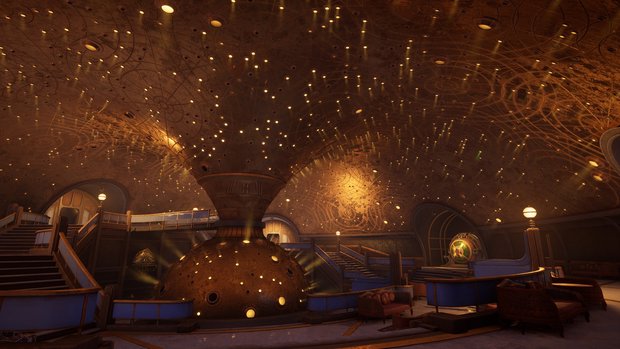
Cyan's use of lighting and color has always been first-rate, but in Firmament it's on another level. One highlight is the multileveled Curievale ice factory, with its tungsten orange bulbs glowing against the cold blue metal. It's matched by the unusual coastal acid baths of Juleston, where massive battery docks float in a scarlet pool during the golden hour moments before sunset. These places are nearly matched by the expansive greenhouse facility of St. Andrews, which manages to hold its own thanks to a lush array of botanical gardens along its stunning mountain view. Firmament's soaring scenes sometimes made me feel like an ant scurrying around the remnants of a forgotten empire, and I dug every moment of exploration. No one makes environments that feel simultaneously cozy and oppressive quite like Cyan.
Later on, as you get to explore more of the game’s three realms (another parallel to the "Ages" of the Myst games), you'll take in expansive panoramic views from craggy clifftops, steampunk trams, and impressive spires. If you've got a computer powerful enough to let Firmament truly strut its stuff, prepare to be wowed. Its minimum system requirements aren't particularly demanding, but the more you can throw at it, the more you'll get out. Amazingly, for all the wonder on display, the game only takes 12 gigs of hard drive space, perhaps one of its grandest magic tricks of all.
It's just a little unfortunate that these beautiful environments lack the intimacy that made the Myst games so rewarding to explore. With very little in the way of interactivity beyond sending your Adjunct into sockets and reading the occasional book or leaflet, you won't find yourself combing through clutter on desks or getting up close and personal with intricate objects. Gone is the "I could spend an hour in this scientist's workshop" feeling from games past, replaced with a hefty scope usually reserved for open-world titles. With such vast spaces, you might feel the temptation as I did to constantly sprint through the environments—they're full of gorgeous sights, but ultimately carry an emptiness somewhat reminiscent of the halls of Uru's caverns (which were built to accommodate high levels of MMO player traffic). I didn't mind this too much, but some areas started to become a bit of a slog to traverse by the fourth or fifth trip just because of how big they are.
The accompanying soundtrack is fitting and atmospheric. It’s woven nicely into the gameplay and doesn’t call much attention to itself, to the point where I barely even noticed it. It’s very much of the ambient variety, though the closing credits theme from VNV Nation is a sweeping banger of a tune that I had to add to my music library.
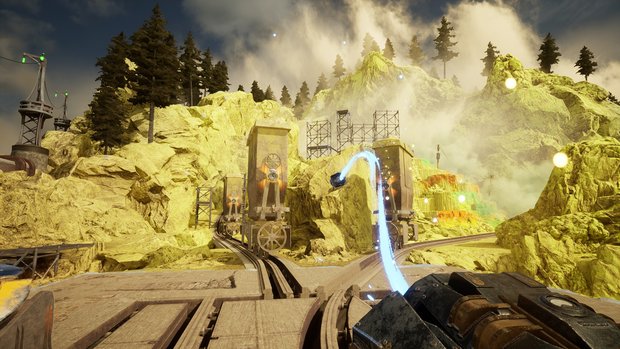
Puzzles are challenging but (mostly) fair, and though there’s a range in level of difficulty, they’re probably a little easier overall than the average Myst riddle. They also vary quite a lot in mechanics and how satisfying the payoffs are. One conundrum involves coupling and uncoupling train cars that can be driven forward and raised vertically along two axes of tracks, which is quite fun. The puzzle requiring connecting rotating platforms (serving as massive battery terminals) isn’t quite as strong, with a confounding setup that is improperly telegraphed to make the mechanics clear. The “giant mixer” puzzle is especially complicated and bewildering at first, but was immensely satisfying once I finally figured it out.
Another hit-or-miss obstacle involves raising and rotating makeshift elevators to traverse a gap, which I mostly liked except that you can't see the effect you're having on the elevator platforms while you rotate them. That makes for a slightly tedious task of trial and error, where patience wins out over cleverness. In fact, a fair number of Firmament's brainteasers involve manipulating things from afar, without being able to directly see what you're doing while making adjustments. It's a hallmark of design philosophy from Myst and Riven too, but it feels over-relied on here and leads to a little more frustration than necessary.
The only puzzle that’s outright “bad” is an extended underwater exploration section that involves piping steam along a twisted web of frozen walkways. It's like a mixture of stumbling around a confusing maze and doing plumbing from hell at the same time, with 360 degrees of pixel hunting to find the well-hidden Adjunct sockets that will allow you to proceed. It's actually one of the most miserable puzzles I've ever had the misfortune to suffer through in recent memory, and nearly killed my enthusiasm to progress. Sadly, due to the order in which I tackled each realm, this was the last major puzzle I completed (thanks only to a video walkthrough I couldn't have done without), ending the whole experience on a bit of a sour note. It pains me to say it, knowing how much work had to have gone into this section, but I firmly believe the game would have been stronger if they'd just cut out this puzzle altogether.
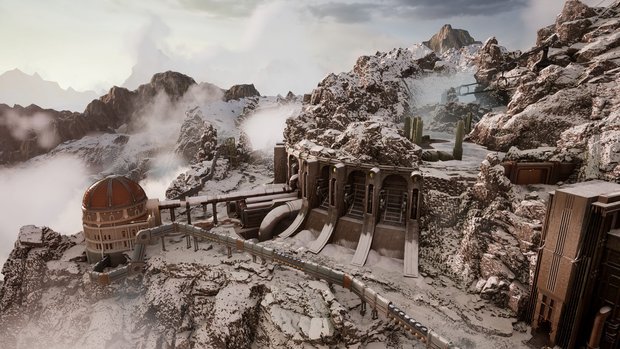
The good puzzles are far more numerous and really deserve to be celebrated, though. There are a couple of rather satisfying challenges that involve the operation of gigantic cranes (with a sense of scale that really impresses), and I especially got into the game's "harvester" puzzle, where you pilot a free-roaming vehicle around one of the realms, stopping at various small outposts that contain their own quick little challenges to solve. I haven't seen anything quite like it in a Cyan game before, and was delighted at the change of pace it provided—it reminded me just a touch of the vehicle sections of Half-Life 2.
I played Firmament on PC and had a smooth experience, but let's talk a minute about the Mac port. On my 2022 Mac Studio (one of the more powerful systems in Apple's lineup), boot-up performance was atrocious. It took about a minute of loading to get to the main menu, as opposed to about ten seconds on Windows, and even the loading screen animation was unpleasantly stuttery. Gameplay wasn't at all fluid either, with plenty of framerate hitches throughout that I didn't see at all on my PC. It's a pretty subpar port, with the graphics being a huge step down from the PC on comparative specs. Cyan has always provided a home to Mac gamers since their inception, so this is a little disappointing. Considering that the game is supposed to be a launch title for Apple's upcoming Vision Pro headset with the same underlying architecture, we can only hope this means Cyan will be putting a little more love into the Mac version in the coming months.
Speaking of headsets, Firmament launched with VR support on PC as well. Whether standing or sitting, seeing the most impressive areas of the game in fully immersive virtual reality certainly merits a go, but I consider it a bonus novelty rather than something worth experiencing the whole way through. There are more loading screens in VR than in the flatscreen edition, for one thing, including some that break up the otherwise seamless transition sequences during the game's numerous uses of the "conveyance pods" (Firmament's equivalent of Myst's linking books), resulting in a major disruption of immersion.
A bigger problem, at least for me, is that in full free-movement mode, I was only able to handle about twenty minutes of play before significant motion sickness set in. Thankfully the game has a teleport option for players who do better with that style of locomotion. In its current form, the VR version also has glitchy subtitles that sometimes flicker in a distracting mess, and the menus are frankly quite baffling to navigate. With no crosshair where you're "aiming" in VR space, clicking on the correct menu buttons is a bit of a crapshoot. The most reliable option is to walk right up to the menu buttons (yes, the menu exists in its own 3D area) and put your hand out just inches away from what you intend to click on. It's stuff like this that makes Firmament feel like a great flatscreen game masquerading as a so-so VR one, though perhaps future updates might lessen this impression somewhat.
Even played in standard mode on a PC, where I had by far the best experience, there are still a couple aspects that feel unpolished. There are some awkward interactions, like pressing the escape key to exit out of book-reading mode (when that also calls up the menu), and the lack of page turning sound effects feels like a strange absence for a company that usually takes every opportunity to inject terrific audio design wherever possible. Strangest of all, when I'd returned to one of Firmament's grandest vistas to take in the sights once again, I was disappointed to find that in the time since my last visit, the shutters had closed over the expansive window looking out, with no way to reopen them. For a game that offers dazzling views to reward player progress, it seems especially odd to remove access to these sights during return trips.
My last technical nitpick has to do with limited save slots. It's bewildering to me that after so many decades of complaints from players and critics alike, so many games still get this wrong. Firmament only offers two saves, plus an autosave that automatically deletes itself if you load a manual save. This was sufficient for getting me through my playthrough without disaster, but it's a rather arbitrary limit, and invites trouble from potential game-breaking bugs to cause even more catastrophe.
Final Verdict
None of these relatively minor criticisms prevent me from giving Firmament a firm recommendation, especially for Myst fans playing the non-VR version. The sense of exploration is second to none, and the story, while taking a definite backseat to the gameplay, was captivating enough to retain my interest all the way up to the surprise finale. Firmament may have some aspects that feel like it came out of the oven just a touch too early, but it's easy to forgive most of its missteps (well, aside from that evil plumbing maze) due to some engaging puzzles and its utterly amazing environments that immersed me in a way few games even come close to. It's a testament to Cyan's ability that thirty years after Myst, they're still continually evolving and pushing the visual envelope—and it gives me hope that the studio’s best days as worldbuilders could still be ahead.
Hot take
With a gorgeous setting full of incredible architecture and nicely varied puzzles, Firmament is another confident and cerebral showcase from the legendary artists at Cyan.
Pros
- One of the most impressive and beautifully realized game worlds since Riven
- Good variety of puzzles that mostly hit the mark
- Intriguing central mystery with a heck of a payoff
Cons
- A whole lot of backtracking through vast areas
- One particular puzzle borders on sadism
- VR implementation isn't that great (yet)
Sean played Firmament on PC using a review code provided by the game's publisher.


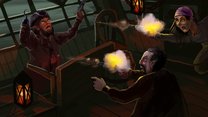

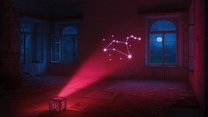


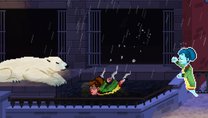


1 Comment
Want to join the discussion? Leave a comment as guest, sign in or register in our forums.
Thank you for your review as a Myst fan this is one that I will certainly play. It perhaps not in VR. I get motion sickness with some games so I don’t want to try it with this one. Only 2 SAVES!!! I will be making a side backup of my saves so I don’t run into trouble. Great review!
Reply
Leave a comment